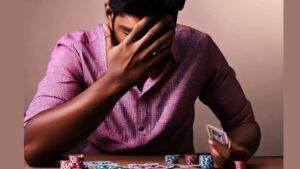Gambling compulsions, often associated with conditions like gambling addiction or pathological gambling, have complex psychological underpinnings that contribute to their development and persistence. Several psychological factors play a role in fueling the compulsion to gamble, and understanding these factors is crucial for developing effective interventions and support mechanisms. Here are some key psychological reasons behind gambling compulsions:

- Reward System Activation:
- Dopamine Release: Gambling activates the brain’s reward system, leading to the release of dopamine. Dopamine is a neurotransmitter associated with pleasure and reinforcement, creating a sense of euphoria when a person wins.
- Pavlovian Conditioning: The anticipation of a potential reward, even more than the reward itself, can become a powerful psychological motivator. Over time, individuals may develop a conditioned response to the act of gambling itself, seeking the thrill associated with the possibility of winning.
- Escape and Coping Mechanism:
- Escape from Reality: For some individuals, gambling serves as a means of escaping from stress, anxiety, or negative emotions. The act of gambling provides a temporary distraction from life’s challenges and offers a fantasy world where problems seem to fade away.
- Coping with Emotional Distress: Gambling can become a way for individuals to cope with emotional pain, loneliness, or boredom. The emotional relief experienced during gambling becomes a reinforcing factor, leading to a cycle of compulsive behavior.
- Illusion of Control:
- Perceived Skill Influence: Some individuals believe that they have a certain level of skill or control over the outcome of their gambling activities. This perception can lead to a distorted sense of confidence and encourage continued gambling, despite evidence to the contrary.
- Near Misses: Near misses, situations where the outcome is narrowly missed, can strengthen the illusion of control. The brain interprets these near misses as almost-wins, further motivating individuals to continue gambling in pursuit of the elusive win.
- Biological Factors:
- Genetic Predisposition: Genetic factors may contribute to an individual’s susceptibility to gambling compulsions. Research suggests that certain genetic variations may increase the likelihood of developing addictive behaviors, including those related to gambling.
- Neurochemical Imbalances: Imbalances in neurotransmitters, such as serotonin and norepinephrine, have been linked to impulsivity and addictive behaviors. Individuals with these imbalances may be more prone to developing gambling compulsions.
- Social and Environmental Influences:
- Social Reinforcement: Social factors, including peer pressure and societal norms, can influence the development of gambling compulsions. If gambling is prevalent and socially accepted in a person’s environment, the likelihood of developing a compulsion may increase.
- Early Exposure: Exposure to gambling at an early age, whether through family, friends, or the media, can contribute to the normalization of gambling behavior and increase the risk of developing a compulsion.
- Availability and Accessibility:
- Easy Access to Gambling: The widespread availability of online gambling platforms and the easy accessibility of casinos contribute to the development of gambling compulsions. The convenience of engaging in gambling activities can lower the barriers for entry and increase the frequency of participation.
Understanding these psychological factors is essential for designing effective prevention and treatment strategies for gambling compulsions. Recognizing the interplay of reward systems, coping mechanisms, cognitive distortions, and environmental influences provides a foundation for developing interventions that address the multifaceted nature of gambling-related disorders.

Navigating the Risks of Online Gambling: A Comprehensive Guide to Mental, Physical, Emotional, and Financial Well-Being
Introduction:
The rise of online gambling has brought about convenience and excitement, but it also comes with its fair share of risks. Beyond the potential financial losses, online gambling can have profound effects on mental, physical, and emotional well-being. In this article, we’ll explore these risks and offer coping strategies for those seeking to break free from the clutches of gambling addiction.
Mental Health Challenges:
Engaging in online gambling can take a toll on mental health. The constant anticipation, wins, and losses create a rollercoaster of emotions that can lead to anxiety, stress, and even depression. The pressure to keep up with the highs of winning and the lows of losing can contribute to a cycle of addictive behavior.
Coping Strategy:
- Seek Professional Help: If you find it challenging to control your gambling habits, consider reaching out to mental health professionals or support groups specialized in addiction. They can provide the necessary guidance and support to overcome the challenges.
Physical Well-Being:
The physical toll of online gambling is often underestimated. Prolonged hours spent in front of a screen can lead to sleep disturbances, eye strain, and a sedentary lifestyle, contributing to a decline in overall physical health.
Coping Strategy:
- Maintain a Healthy Lifestyle: Ensure a balance between online activities and a healthy lifestyle. Prioritize adequate sleep, regular exercise, and a nutritious diet to support your physical well-being.
Emotional Challenges:

Online gambling is an emotional rollercoaster that can impact relationships and personal well-being. The thrill of winning may lead to overconfidence, while losses can result in frustration and anger. This emotional turbulence can strain personal connections and contribute to a sense of isolation.
Coping Strategy:
- Communicate Openly: Share your online gambling experiences with trusted friends or family members. Open communication can foster understanding and provide a support system to navigate the emotional challenges associated with gambling.
- Explore Alternative Hobbies: Engage in activities that bring joy and fulfillment outside of online gambling. Finding alternative hobbies can redirect emotional energy and provide a healthier outlet for stress and excitement.
Financial Implications:
The most tangible risk of online gambling is the potential for financial ruin. Uncontrolled gambling can lead to substantial monetary losses, debt, and financial instability, impacting not only the individual but also their family and loved ones.
Coping Strategy:
- Financial Counseling: Seek the guidance of financial counselors who can assist in managing debts and developing strategies for financial recovery. Many communities offer free or low-cost financial counseling services.
How to Deal with Gambling Addiction:

Recognizing the signs of gambling addiction is crucial for taking proactive steps toward recovery. If you or someone you know is struggling with online gambling addiction, consider the following coping strategies:
- Self-Exclusion Programs: Many online gambling platforms offer self-exclusion programs. Utilize these tools to restrict access to gambling sites and break the cycle of addiction.
- Professional Counseling: Seek the assistance of mental health professionals or addiction counselors who specialize in gambling disorders. Professional support can provide tailored strategies for overcoming addiction.
- Support Groups: Joining support groups, both online and offline, can offer a sense of community and shared experiences. Connecting with others facing similar challenges provides valuable insights and encouragement.
- Replace Gambling with Positive Habits: Identify and engage in activities that bring joy and fulfillment without the negative consequences of gambling. Building positive habits helps fill the void left by addictive behaviors.
Conclusion:
Online gambling poses various risks to mental, physical, emotional, and financial well-being. Recognizing these risks is the first step toward a healthier, more balanced lifestyle. By implementing coping strategies and seeking support, individuals can break free from the grips of gambling addiction and embark on a path toward recovery and personal well-being. If you or someone you know is struggling with gambling addiction, remember that help is available, and taking the initiative to seek support is a courageous step towards a brighter future.
Latest Posts
- Millets: The Nutritional Powerhouse for a Healthier Tomorrow
- 6 Unknown Causes of High Blood Pressure and Heart Attack | By Arvinsinh Rana
- These 5 Reasons makes you Angry | How to Deal with it! | 8 Tips for Anger Management
- Indian Lifestyle: Necessity or Choice? The Ultimate Exploration : By Arvindsinh Rana
- You must try this Magical Supplement for Mental Well-Being: (Anxiety-Depression-Sleep issues)





3 Responses
[…] Why Gambling is so Addictive! | Risk of Online Gambling and How to Quit Gambling Addiction […]
[…] Why Gambling is so Addictive! | Risk of Online Gambling and How to Quit Gambling Addiction […]
[…] Why Gambling is so Addictive! | Risk of Online Gambling and How to Quit Gambling Addiction […]